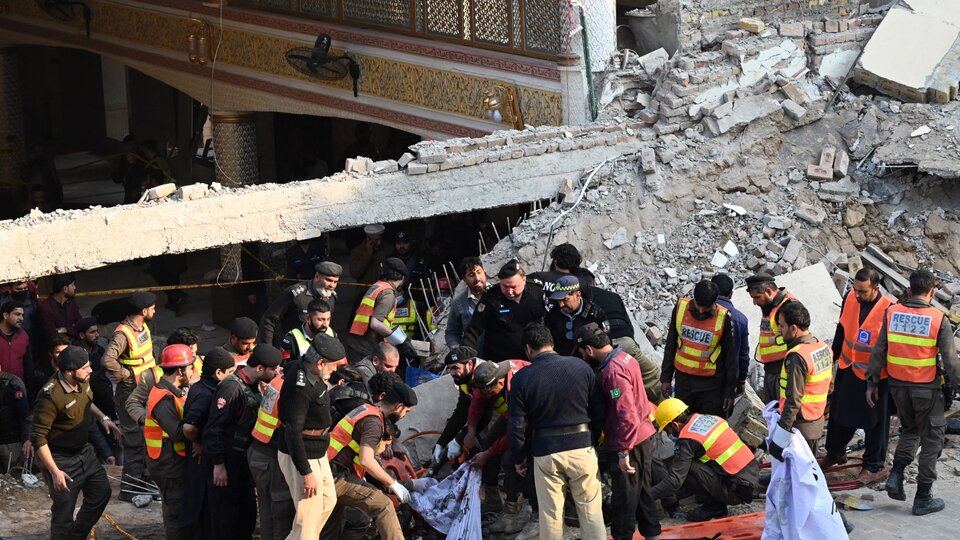A suicide attack on the mosque in a police compound in Peshawar –northwestern Pakistan– caused this Monday at least 44 dead and 157 injured, mostly members of the security forces, one of the worst attacks against this body in the history of the country. The attack occurred around noon at a mosque in Police Lines, a residential and training center for police officers where civilians are not allowed.
300 faithful at prayer time
Rescue teams continue to locate the injured under the rubble from the explosion that occurred when the mosque was very crowded at prayer time. “There were more than three hundred faithful”, Police officer Muhammad Ijaz Khan told the media at the entrance to the attacked temple.
The attacker was in the first row
Pakistani Defense Minister Khawaja Asif revealed that the suicide bomber was in the front row: “It is time for us to fight the war on terror again,” Asif said in an interview with Pakistani Geo TV.
The Prime Minister of Pakistan, Shehbaz Sharif, condemned the “brutal murder of Muslims when they prayed to Allah”, while traveling to the area of the tragedy to visit the victims.
So far, no insurgent formation has claimed responsibility for the attack.
The Taliban nexus
Terrorist attacks and insurgent attacks have increased in recent months in Pakistan after several years of relative calm. There is a resurgence of the Pakistani Taliban group Tehereek-e-Taliban Pakistan, a confluence of tribal armed groups created in 2007 and an ally of the Afghan Taliban. Last November they broke a ceasefire with the government.
Since its formation, the group has carried out a campaign of terrorist attacks throughout the country, killing thousands of people, many of them members of the security forces. He also attempted to assassinate future Nobel laureate Malala Yousafzai in 2012.
The jihadist group Islamic State (IS) has also carried out attacks in the past in Pakistan, one of the worst in 2018 against a rally in Balochistan with 128 dead and 122 injured.
The attacks began to decline in 2014 after a crackdown by Pakistani authorities, but signs of a resurgence worsen relations between Pakistan and an Afghanistan under Taliban rule.
Silvana Barrios -political scientist from the UBA and researcher in the South Asia group at CARI- told page/12 that The attack occurred in an area of many members of the Pashtun ethnic group – the same as the Taliban, which does not mean that all of them are – and where historically, this fundamentalist group has disputed control of the territory. There were tremendous waves of violence here in the past and the army managed to get the situation under control a few years ago –with strong US support–, restoring urban security. According to Barrios, “the risk is that this could become a restart of the violent spiral. The level of military intelligence to carry out an attack in such a guarded place speaks of very sophisticated logistics. But it is not clear which group of the various that exist in the region committed the attack: none claimed responsibility for it. Daesh –the local version of the Islamic State– always signs its attacks and usually attacks the Shiites before the Sunnis, as was the case; this happened in a context of great instability with a recent electrical blackout throughout the country for 24 hours, high inflation and economic crisis.It also coincides with the visit of the International Monetary Fund to the country and the proximity of highly disputed elections.
Silvana Barrios notes that the latest attacks in the area tend to be against security forces rather than civilians. To the extent that the episodes are these, there may not be a generalized spiral of violence as in the past. The area is complex because it has various radical groups, small but operative. And the situation could spill over again.
